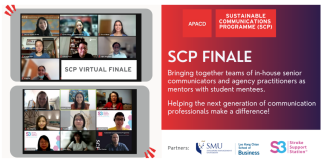
The third cohort of the Sustainable Communications Programme (SCP) presented its public relations and marketing ideas to S3, a charity focused on building awareness of stroke and its recovery. Following the midpoint-check last October, Singapore Management University (SMU) students delivered their final presentations in January 2022.
In its second year, the programme places teams of Lee Kong Chian School of Business (LKCSB) students under the tutelage of experienced communications professionals as they design communication projects for local social enterprises and charities.
The incidence and burden of stroke are increasing with the aging population. At the same time, COVID-19 has changed how Stroke Support Station S3 operates, replacing ground activities with virtual services. S3 is also amplifying the use of social media to market its programmes and services. In a two-hour presentation, students and mentors collaborated on a marketing and public relations plan to help S3 find new ways to reach stroke victims and their communities.
Two student and mentor teams presented plans. Team 1 consisted of Dabria Yiong (Year 3), Sim Ying Ting (Year 2) and Koh Jie Min (Year 3). Team 2 comprised Mansha Bakshi (Year 1), and Ridhima Agarwal (Year 3).
Karen Wong, Team 1 mentor, Regional Affairs Director from Abbott said, “Team 1’s communication strategy focused on the mental health of stroke survivors and caregivers. The effort was designed not to disrupt S3’s current practices, but to support the pivotal and often overlooked role of caregivers in a stroke victim’s management and recovery”. The students also leveraged key insights of caregivers and deliver ideas that the client could incorporate in existing initiatives.
“The structure Team 1 came up with does a good job of elucidating how we can work with the community, especially with new media channels which offer avenues for warmer, more personal communication with our audience,” adds Kristy Wong, Marketing Communications Manager, Stroke Support Station (S3).
Team 2 first conducted a survey to determine the needs of its target audience. From there, the team developed a three-part strategy involving both media and on-the-ground engagement. Their proposed media initiative combined Instagram stories and quizzes to promote understanding and empathy for the stroke survivor’s experience. Direct personal communication included Facebook Live, outreach to stroke survivors’ younger family members through local universities, and a Caregivers’ Day for caregivers to network, support and learn.
Shruti Bose, Team 2 mentor, ad interim Head of Communications at Roche Diagnostics Asia Pacific said, “Team 2’s survey helped the team define who they wanted to reach— younger family members of stroke survivors, and how. Although there were challenges along the way and conditions were less than ideal, Team 2 found smart and creative solutions to address this, such as launching their project with a survey that helped them determine which audience to address”.
“This experience gives students an edge in the professional world. It helps them develop the personal qualities that will make them effective in the workplace, like tenacity and the ability to develop relationships with people they will only know virtually,” says John Morgan, SCP Streeting Committee member and leads Corporate Affairs in RGE.
Marla Arnall, leader of the SCP Steering Committee, Communications Manager, Amazon Asia Pacific said, “On behalf of Steering Committee, I would like to thank Professor Tracy Loh from SMU, Kelvin Goh from the SMU Communications Management Society, communications agencies Wachsman, Edelman, Golin, and Redhill, as well as the mentors who committed their time to this initiative. Finally, I would like to thank the wonderful team at S3 for joining Cohort 3 as our charity partner.”